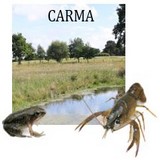CARMA
 |
Ecological connectivity and interactions between species in a biological invasion context: Amphibians and invasive crayfish in pond networks |
|
Research
Context and Issues
Continental aquatic ecosystems are one of the most species-rich ecosystems. However, they are subject to many anthropological disturbances, among which biological invasions are often viewed as a major threat to the biodiversity they provide. The success of invasive species often exceeds the 10% threshold of the “Tens rule” in aquatic habitats. Among continental aquatic habitats, ponds are distinctive due to their small size and shallow depth, which result in severe environmental limitations (hydroperiods, temperature, etc.). The only species (native or invasive) that survive in ponds are those able to tolerate these limitations.Results of a recent Ph.D. thesis study has shown great differences in the invasion rate of the invasive red-swamp crayfish in two pond networks in the Brière and Mès marshes. These networks are inhabited by aquatic metacommunities in which amphibians (among other species) share similar ecological characteristics with the invasive crayfish (trophic level, amphibious nature, etc.). These amphibian and crayfish species can interact directly (via predation) or indirectly (via competition). The mechanisms involved in the interactions that occur among (via connectivity networks) and within (via competition or predation) ponds could explain why the crayfish does not successfully invade all ponds in such a small area (a few km²).
Objectives
To understand which processes influence the coexistence of amphibian species in pond networks, we will: (1) assess whether the red-swamp crayfish influences the probability of occurrence of native amphibians in ponds; (2) assess the connections within the pond networks used by the invasive and native species; and, (3) explore whether these species interact directly or indirectly by reconstructing trophic links.Methodology
Targeted metabarcoding of environmental DNA will be used to assess the presence/absence of amphibians and crayfish in ponds. Landscape genetics will be used to understand the landscape connectivity of four species, and stable isotope analysis will help to ascertain whether amphibians and crayfish interact via predation and/or competition in these ponds.Expected Results
This project will increase our understanding of the processes that promote the coexistence of species that are ecologically similar in metacommunitites defined by a discrete distribution of habitat patches. Assessing the relative importance of differences in connectivity between species, and their direct and indirect interactions, will improve our ability to manage pond communities that are characteristic of agricultural landscapes in western France.Publications issued from the project
Belouard Nadège, Petit Eric J., Cucherousset Julien, Paillisson Jean-Marc (2024). Variation of the stable isotope niches of native amphibians in ponds invaded by the red swamp crayfish. NeoBiota, 2024, 93, pp.245-262. ⟨10.3897/neobiota.93.120477⟩
BELOUARD, N. PAILLISSON, J.-M. OGER, A. BESNARD, A.-L. PETIT, E.J. (2019) .Genetic drift during the spread phase of a biological invasion
People involved
 |
BÉLOUARD Nadège, Scientist Phone : +33 (0)2 23 23 70 84 Email : nadege.belouard@univ-rennes1.fr |
 |
BESNARD Anne-Laure, Technician Phone : +33 2 23 48 54 43 Email : anne-laure.besnard(at)inrae.fr |
 |
OGER Adrien, Technician Phone : +33 2 23 48 54 49 Email : adrien.oger@inrae.fr |
 |
PETIT Eric, Scientist Phone : + 33 2 23 48 70 36 Email : eric.petit@inrae.fr |
 |
ROUSSEL Jean-Marc, Scientist Phone : +33 2 23 48 57 75 Email : jean-marc.roussel@inrae.fr |
Partners
Funding and Support
- French Ministry of Higher Education and Research (Ph.D grant)
